
We Westerners who arrived here soon after the fall of Communism took some time to learn a lesson: Democracy is not just a light that you switch on, and everything in the room becomes just like at home. With hindsight that is obvious, but the question then is, how long does it take before a country can be said to have a “mature” democracy?
Judging by the recent actions of TV Nova, the answer seems to be “ longer than 28 years”. Of course TV Nova was widely welcomed when it started in 1994 as a symbol of a democracy, in a country where a totalitarian State had controlled media absolutely. However it quickly abandoned its initial promises to provide quality programme and became a typical commercial TV station, whose main goal was to maximise TV ratings.
Czech TV, meanwhile adopted the position of the Public Service broadcaster in a democratic country, often quite clearly looking to the BBC for direction and inspiration. As such, CT has consistently shown the biggest interest in hosting political debate. Its most well – known moderator is Vaclav Moravec, who in his early years worked for the BBC World Service, and to me that experience is visible and sets him apart from others in Czech media. At election time CT has always held Super Debates, where as many as eight representatives from different parties take part. I find them a bit unwieldy,but of course I come from a country dominated by only two parties. CT has to give voice to all these parties in the interests of fairness (in the interests of democracy, in fact).
A few days ago it was announced that Andrej Babis, the leader of ANO, currently the most popular party in opinion polls, refused to take part in the final CT Super Debate. Instead, he would take up an invitation from TV Nova to debate head-to -head with Lubomir Zaoralek, the leader of CSSD, currently placed second in the polls. TV Nova then decided that it would run this debate at exactly the same time as CT’s debate, or more accurately, starting five minutes earlier.
Much of the resulting controversy focuses on Babis. He has often expressed his “disapproval” of Moravec (itself a worrying signal in a democracy), and it would appear that he thinks it OK to decide who will ask him questions, be that the moderator or the political opponent.
But I would like to draw your attention to the role of TV Nova in this. On the night before the elections, TV Nova is forcing Czech citizens to decide whom they would like to listen to more: the single most powerful Czech politician, and one opponent, or the full range of political leaders whom they can vote for next day. If they opt for TV Nova, it means that they will not at all hear the voice of any centre-right or right wing political leader. If they opt for CT, they will not hear the voice of the most influential individual in current Czech politics, and how he responds to challenges from across the political spectrum.
Why have Czech citizens been put in this position? The answer is that TV Nova either does not understand or does not care about the role of a national broadcaster in a democracy at election time. It cares only about its ratings and its narrow competitive position with CT.
In the UK, this does not happen. No law is needed either, to ensure that it does not happen. The major TV broadcasters (there are four) just behave like adults with responsibilities, and get together to work out a schedule where all of them have a chance to broadcast political debates. They do not allow a powerful politician to play one of them off against the others. They even agree that footage from one debate can be accessed and broadcast later by the other channels.
That is what should have happened here. Nova, (and TV Prima) should have decided much earlier if they wanted to host political debates with the same level of commitment as has always been shown by CT. They could then have got together with CT, and agreed what they wanted to do and when, and after that present their plans to the politicians. This approach asserts the correct balance between broadcaster and politician in a democracy. An individual politician should not dictate which broadcaster and which moderator he or she will submit to for examination. That is the way it is done in Russia and, sadly, present day Poland, but the Czech Republic’s citizens deserve better.
Already it is being asked whether the Nova debate programme may break the law by not allowing the voice of other major parties; but regardless of that, TV Nova can easily put right its main offence against democratic principles, by re-scheduling. It could run its debate the night before; it could run it after CT’s debate finishes; or if it could swallow its pride, and could ask CT very nicely if CT could start at 19.00, thus allowing Nova to run its debate at 21.00.
I do not know what plans Christoph Mainusch, the current (and low-profile) CEO of TV Nova, has for his future career. Perhaps surprisingly, Mr Mainusch is a German national and his career in media started at a German public service broadcaster. But if he sees himself perhaps moving back to a broadcaster in a bigger Western European country in a senior role, he might want to consider how a potential future employer might view this controversy. In a mature democracy a national broadcaster – public or private – recognises a duty to uphold basic democratic values. It needs a leader with the class to recognise this duty, and the balls to ensure that it is not manipulated by powerful politicians. Well, Mr Mainusch? Do you pass those tests?